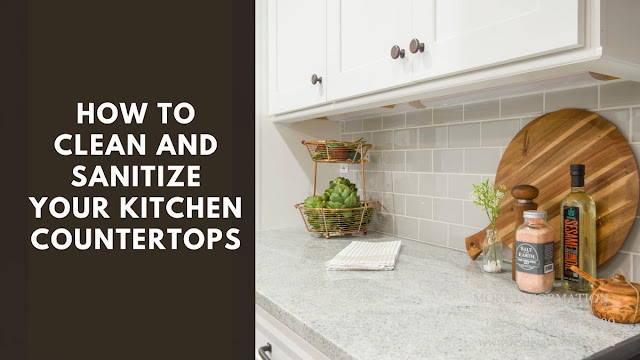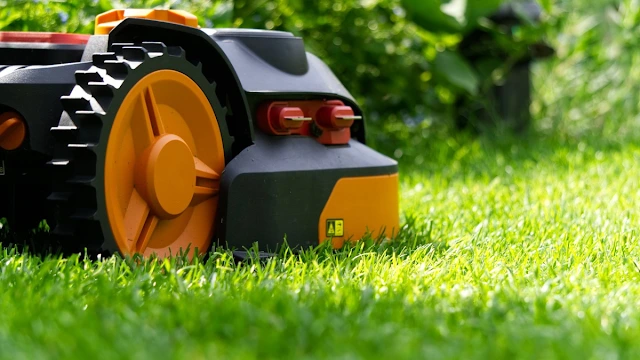
Kitchen countertops are a major part of food preparation, making cleanliness essential not only for maintaining appearance but also for ensuring food safety. Proper cleaning and sanitizing prevent the spread of bacteria, grease buildup, and stains. But since different countertop materials require different cleaning methods, it’s important to know how to clean each one effectively. Let’s explore how to keep your kitchen countertops spotless and safe.
Types of Kitchen Countertops
Before diving into cleaning methods, it’s important to identify what type of countertops you have. Each material has specific needs when it comes to cleaning and maintenance.
Granite Countertops
Granite is one of the most popular choices for kitchen countertops because it is durable and stylish. However, it is also porous, which means it can absorb liquids and become stained if not properly sealed. Granite requires gentle cleaning to preserve its shine and prevent damage to the sealant. Regular sealing is necessary to maintain the stone’s integrity and to protect it from absorbing spills.
Marble Countertops
Marble is another luxurious countertop material, known for its beauty but also for its delicacy. Marble is highly porous and can be easily scratched or etched by acidic substances. This makes it crucial to avoid using acidic cleaners like vinegar or lemon juice on marble countertops. Regular cleaning with gentle, non-abrasive products is key to keeping your marble looking polished and stain-free.
Laminate Countertops
Laminate countertops are a budget-friendly option that comes in a variety of designs and colours. Though laminate is resistant to stains and scratches, it can get damaged by harsh scrubbing or extreme heat. Cleaning laminate is simple, but it’s important to use mild products to avoid stripping the surface or causing wear.
Quartz Countertops
Quartz is a man-made material that combines natural quartz with resins, resulting in a durable, non-porous surface. Quartz countertops are highly resistant to stains and bacteria, making them low-maintenance. However, it’s still a good idea to clean them regularly to keep them looking their best. Abrasive cleaners and scrubbing pads can damage quartz, so stick to gentle cleaning methods.
Wooden Countertops
Wood countertops bring warmth and character to a kitchen but are much more high-maintenance. They are prone to water damage, staining, and bacterial buildup if not cared for properly. Wooden countertops should be sealed regularly and cleaned with non-abrasive, moisture-resistant cleaners. Since wood is porous, it’s important to wipe up spills quickly and ensure the surface is properly dried after cleaning.
General Cleaning Tips for All Countertops
Regardless of the type of countertop you have, regular cleaning is essential to prevent bacteria buildup and maintain the material’s longevity.
Basic Supplies You’ll Need
For cleaning most countertops, you’ll need the following items:
| Items | Description |
| Soft Cloth or Sponge | Ideal for wiping down surfaces without scratching them. |
| Mild Dish Soap | A gentle cleanser that’s safe for most materials. |
| Warm Water | Helps dissolve grease and lift dirt. |
| Microfiber Towel | Perfect for drying the surface and preventing streaks. |
| Disinfectant Spray or Wipes | Use these to sanitize and kill bacteria, especially after preparing food. |
Step-by-Step Guide to Daily Cleaning
1. Wipe Off Debris – Before you start cleaning, remove all crumbs, spills, and food particles using a damp cloth or sponge. This prevents buildup and keeps your surface free from sticky residue.
2. Use Warm, Soapy Water – Mix a small amount of mild dish soap with warm water. Dampen your cloth or sponge and wipe down the entire countertop. This helps break down oils and grime without damaging the surface.
3. Dry the Surface – Once clean, use a microfiber towel to dry the countertop. This prevents water spots and streaking, which can dull the finish.
4. Sanitize – After cleaning, apply a disinfectant spray or wipe down the surface with a natural sanitizer like vinegar (except for marble and granite). Let the surface air dry or wipe with a clean towel.
How to Clean Specific Types of Countertops
Different countertop materials require specific cleaning approaches to ensure their longevity and avoid damage.
Cleaning Granite Countertops
Granite countertops need special care to maintain their glossy appearance and prevent stains. Avoid acidic cleaners like vinegar, as they can wear down the sealant. Instead, use a mix of warm water and dish soap, or a specially formulated granite cleaner. After cleaning, dry the surface completely to avoid water spots. Granite should also be resealed every year or two to maintain its protective layer.
Cleaning Marble Countertops
Marble is elegant but fragile when it comes to cleaning. Use a soft cloth and a mixture of warm water and mild detergent. Avoid anything acidic like vinegar or lemon juice, which can cause etching and dull the stone’s finish. After cleaning, buff the countertop dry with a soft cloth to prevent streaks. Sealing marble every six months helps to protect it from staining.
Cleaning Laminate Countertops
Laminate countertops are relatively easy to clean. Use warm, soapy water and a non-abrasive sponge to wipe them down. For stubborn spots, a little baking soda mixed with water can be used as a gentle scrub. Avoid harsh chemicals, as they can damage the laminate surface or cause discoloration.
Cleaning Quartz Countertops
Quartz countertops are durable and easy to maintain. Clean them daily with mild dish soap and water, and avoid harsh chemicals like bleach. While quartz is non-porous and resistant to bacteria, using a soft cloth to wipe up spills promptly will keep the surface looking its best. Since it’s resistant to most stains, regular cleaning is often enough to keep it sparkling.
Cleaning Wooden Countertops
Wooden countertops require more frequent care to prevent stains and water damage. Use a damp cloth and mild soap for everyday cleaning. Avoid letting water sit on the surface, as wood can warp or crack. Every few months, apply a food-safe oil or beeswax to condition the wood and keep it protected from moisture.
How to Sanitize Your Kitchen Countertops
Once your countertops are clean, it’s time to sanitize them to kill any bacteria or viruses that may be lingering on the surface.
Using Natural Cleaners
Natural cleaners, like vinegar and baking soda, are effective sanitizers for many types of countertops. Vinegar, for instance, has antibacterial properties and can be mixed with water to create a safe cleaning solution. However, vinegar should not be used on stone countertops like granite or marble because its acidity can erode the surface. Baking soda, when mixed with water to form a paste, can gently scrub away stains and grime without being abrasive.
Using Commercial Disinfectants
For a deeper level of sanitization, commercial disinfectants are widely available and effective. Make sure to choose disinfectants that are safe for your countertop material. Many disinfectants come in spray bottles or wipes for easy application. Follow the instructions on the product to ensure it kills bacteria and viruses effectively.
Steps for Sanitizing Countertops
1. Clean First – Always start by cleaning the surface of your countertop to remove any dirt, grease, or debris.
2. Apply Disinfectant – Spray or wipe the disinfectant across the surface. Be sure to cover the entire area.
3. Let it Sit – Allow the disinfectant to sit for the recommended amount of time (usually a few minutes). This allows it to kill any bacteria or viruses on the surface.
4. Wipe Off – After letting the disinfectant sit, wipe down the surface with a clean, damp cloth. Let it air dry or dry with a microfiber towel.
Mistakes to Avoid When Cleaning Countertops
Cleaning your countertops improperly can cause damage or reduce their lifespan. Here are some common mistakes to avoid.
Common Cleaning Errors
Using Abrasive Pads – Scrubbing too hard or using steel wool can leave scratches on your countertop, especially on softer surfaces like laminate and wood.
Letting Water Sit – Allowing water to sit on stone or wooden countertops can cause staining or damage to the material over time.
Not Sealing Granite or Wood – Failing to seal porous surfaces like granite or wood can result in the absorption of liquids, leading to stains, bacterial growth, and damage.
Harsh Chemicals to Avoid
Certain cleaning products can be too harsh for your countertops. Avoid using bleach, ammonia, or harsh acids like vinegar on delicate surfaces. These chemicals can break down protective sealants or cause discoloration and damage to the material itself.
Conclusion
Maintaining clean and sanitized kitchen countertops is essential for a safe and healthy kitchen environment. By identifying the type of countertop you have and following the right cleaning techniques, you can keep them looking pristine for years to come. Regular maintenance, including cleaning and sanitizing, will ensure that your countertops remain both functional and beautiful.
FAQs: Clean and Sanitize Your Kitchen Countertops
Q: Can I use bleach on my countertops?
No, bleach is too harsh for most countertops, especially natural stones like granite and marble. It can erode the surface and damage any protective sealant.
Q: How often should I sanitize my countertops?
Ideally, countertops should be sanitized at least once a week. However, if you’re handling raw meat or fish, it’s best to sanitize them immediately after use to prevent cross-contamination.
Q: Can I use vinegar to clean all types of countertops?
Vinegar is a natural disinfectant, but it shouldn’t be used on stone surfaces like marble and granite, as its acidity can damage the surface.
Q: How do I remove stains from laminate countertops?
For laminate countertops, mix baking soda with water to create a paste. Gently scrub the stained area using a soft cloth or sponge, and then rinse with warm water.
Q: Do wooden countertops need special care?
Yes, wooden countertops require more maintenance. You should clean them with mild soap, avoid letting water sit on the surface, and regularly apply a food-safe oil to protect the wood from moisture.
Read More
https://www.cleaningview.ca/2024/09/how-to-keep-your-kitchen-floors-spotless.html
https://www.cleaningview.ca/2024/09/quick-and-easy-ways-to-clean-your-kitchen-after-cooking.html
Important: The information provided here in the post is for general informational purposes only. It should not be taken as professional or any other type of advice. Always seek the advice of a qualified professional before implementing this information on your own. Thank you!

